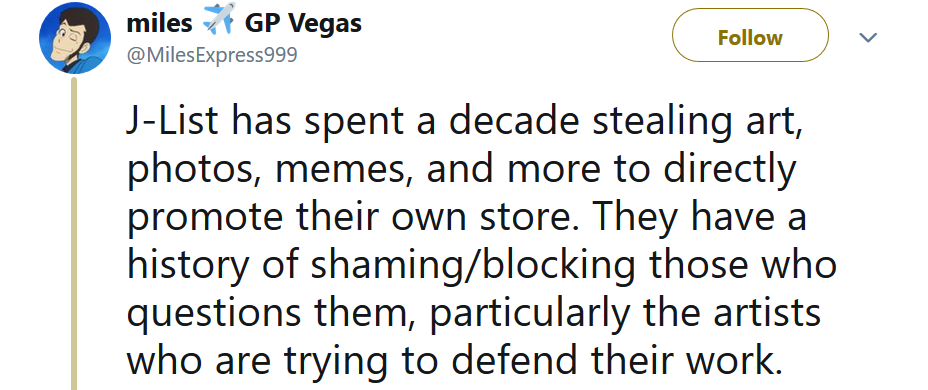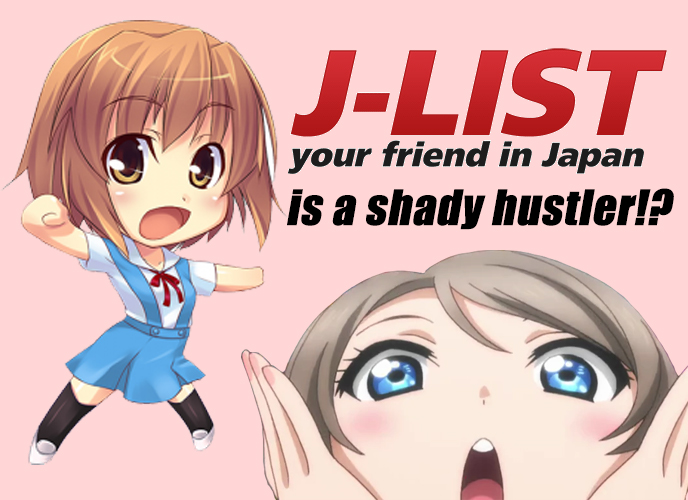Written by Otaku Apologist. Article updated on 16.6.2018. 
15.6.2018 — Recently, JLIST fell into the pits of controversy on their social media. The company has been sharing anime fan art without crediting the artists. Out of the blue, people are outraged, because out of the countless deep-rooted political, economic, and social problems destroying western nations, this makes people feel something.
JLIST has rushed to apologize for their shady business practices in a blog entry.
Some guy named Miles from Crunhcyroll commented this about the situation. Source of tweet.

Alright. Let’s stop with the emotional pack animal bullshit for a second and think with our brains. Shall we, gentlemen?
Why crediting artists is even a thing
Most hentai artists don’t sign their work. They post their pictures online without their name. The art is shared on countless social medias and forums without anybody knowing who drew them. The fans try to pick up their slack, wasting their precious youth sourcing pictures on image sharing sites and their pirate tumblr blogs, when the artists could’ve just stamped their name in the corner of a picture with a website logo to boot. And, the fans will apparently police companies who break this social rule. You waste time on something that doesn’t help you accumulate a higher standard of living, or a pension.
The irony is, these fans think they’re doing something that matters. But most of fans of artists have never financially supported the artists, and never will. Look at any Patreon campaigns of popular artists. They still consider themselves fans, despite contributing absolutely no assistance to their idols. This isn’t all the fault of the fans; Virtually every hentai artist sucks at business. They don’t have merch stores, sponsors, nor do they promote products.
The responsibility for promoting yourself lies with you.
Why this controversy shouldn’t make companies change policies
Most anime fans love and accept that a company shares anime-related art and memes. They’ll follow your social media, and buy products. Many habitually watch anime and hentai on countless pirate sites. They don’t care that you pirate art.
JLIST has made buckets of money in the past 20 years, partly because they haven’t needed to pay every artist whose art they used. The owners of the company could easily sell off their business now and make an easy million or two, and retire. If the only thing you have to watch out for is the long-term effect of your strategy, in a future where your resources are substantially greater thanks to employing the strategy, there’s no real damage to you.
All facts considered, the financial incentives for using pirated art to promote your company are too significant to forego.
JLIST pays their artists
Every company has a staggering number of projects they’re engaged in that need art. JLIST is a good example, as they have tons of websites and social media, and multiple stores. This creates a perpetual need for promotional material. A little piracy cuts costs, but just like normal people who pirate content, they also spend money on original content. I was reminded of this by Jake “Swaps4” Caprino on Twitter.


Tadeas Jojko, whoever he is, said something very uninformed I wanted to comment on. Getting your fan art exposed to JLIST’s hundreds of thousands of social media followers is a nice boon to any aspiring artist. Only because so few artists add their names and website URLs in their pictures, they miss out on this exposure. Moreover, when your work includes your credit, it makes things easier for people actually wanting to link to your website, gallery site, or Patreon. His second point makes no sense at all. For every artist that quits drawing, another takes their place. That’s reality.
The reality of the hentai industry
These ethical issues that continually spring up in the western hentai industry are a natural result of us living in a world of limited resources. People make daily decisions how to spend their money, their time, and their creative energy, to get to a better place in life. Commissioning original art costs tons of money, and it requires organizational skills to keep the art flowing. As I personally commission tons of original art to promote my business, I testify for this.
You cannot hire high-tier artists who are productive and a minimum effort to manage. Your costs would skyrocket. Good artists rake commissions in the range of $100-200 per piece. You are forced to hire cheaper artists, who are less reliable, less consistent, less able to meet the artistic standards of a wider audience of customers. Low-tier artists drain your limited time and energy as a business owner, as you’re forced to constantly email them asking for updates. You have to reserve energy to give them instructions about fixes needed in their pieces. All these resources are away from other important processes in the business. If you want to play it straight, there are significant costs to consider.
A pragmatic hentai company will use pirated art to promote their business. It’s the most cost-efficient path of least resistance.

